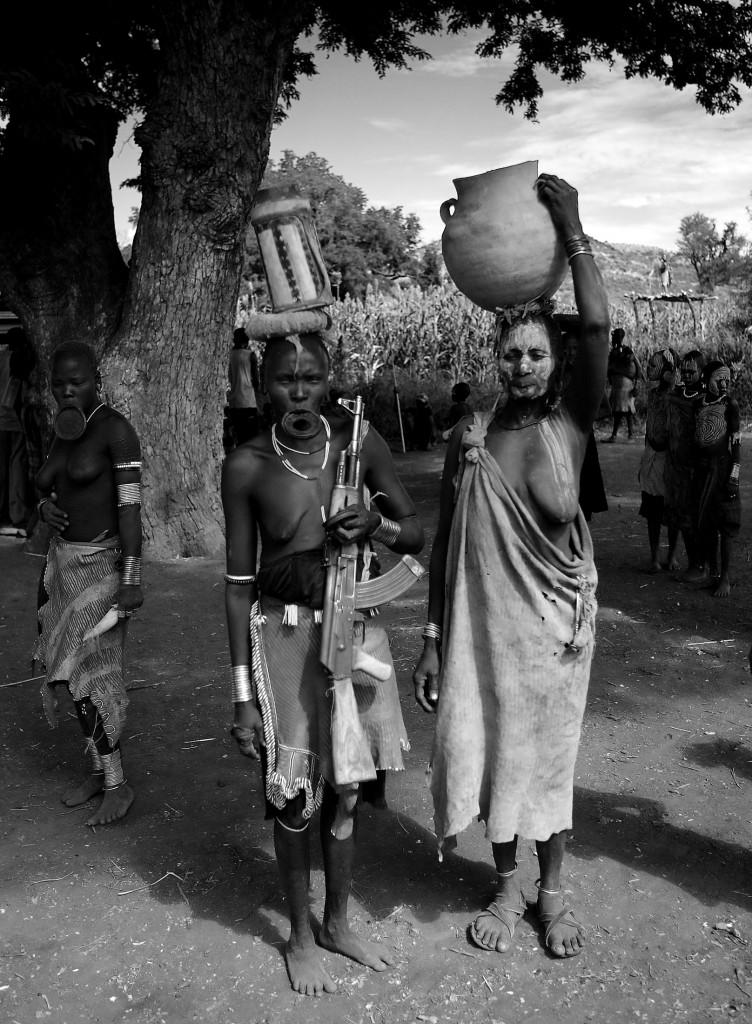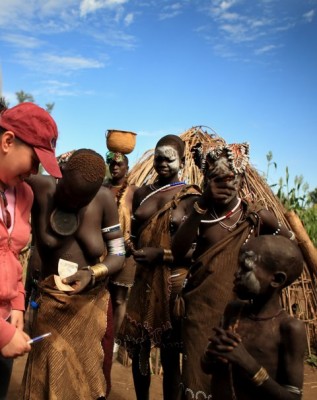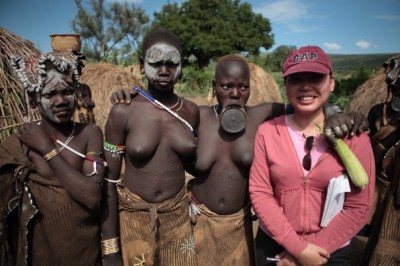Two Women, Two Tribes, and a Journey of a Lifetime is a 9-part series penned by Lim Ka Ea about her one-year stint in Addis Ababa, Ethiopia where she accompanied her husband on his 9th humanitarian mission. No stranger to travel and humanitarian missions herself, she learned that Ethiopia is not really Africa and Africa is not really all about national parks or long distance-runners. She also learned that being a “tai-tai” is so overrated unless there is another “tai-tai” to get into mischief with. This 9-parter tells the story of how two “tai-tais?”explored Ethiopia and discovered their life as both an individual and a woman. This weekly series started with Part I: My first encounter with Africa, Part II: The faces, sounds and smell of Addis Ababa, Part III: The gift of a kindred spirit, Part IV – Getting in synch with nature, Part V – Hardships and Friendship and Part VI – Our first sightings of the local traditional tribes

Part VII – Irada and Ka Ea in Mursiland
We left Jinka at eight the next morning although it is only about 34km from Mago National Park in order to spend sufficient time with the Mursi. Unlike other national parks we had been in Kenya, Mago is yet to establish better infrastructure and some sort of a coherent system for tourism.
Right now, there are no proper signboards to help visitors navigate the sites as well as an explanation of where to pay the entrance fee. We were yet to see the fruits of the 100 and 80Birr entrance fees imposed by the government on each person and car respectively.
We were confused and realised much later that the Mursi in effect, live in Mursi Village situated near the entrance of Mago National Park. Without Eyob, we would have been completely lost.
First, we had to pass an administrative checkpoint in order to enter the park. On the way back, we would then present a receipt of payment, made at the Mago National Park office, situated about one hour away from the Mursi Village. So in the end, even though we didn’t really get into Mago National Park to enjoy the wild life, we still had to take that a one-hour drive to make our payment at the office before driving back to Jinka again. In the heat of about 40 degrees Celcius, it was not difficult to feel annoyed with such illogical logistics arrangement.
We had to pick up a mandatory armed scout on the way to the Mursi Village, hired at the rate of 60Birr per day. We passed by a small group of Mursi taking refuge underneath the canopy of an acacia tree, shielding them from the blazing sun.
As soon as we wound down the car windows to have a better look at them, we were attacked by a swarm of flies which seemed to have originated from the Mursi. There was a sudden waft of strong body odour which hit the both of us from all direction without any warning.
The scent? Not pleasant at all.
We were so disturbed by the smell that we left soon after but not before being bitten by the flies. Irada yelped as soon as she felt a sharp sting on her calf. My turn came after a few minutes and admittedly, it was painful although I remained silent in my attempt to appear courageous. It felt like those strange tiny stinging sensation on your body caused by planktons when you swim in the sea.
After driving about 30km from the checkpoint, we arrived at a small village. We parked on the side of the road, underneath an acacia tree and quickly got down the car, only to be greeted by a swarm of noisy Mursi men, women and children who had abandoned their daily chores.
The women were obviously dressed in their best, although their best consisted of toga-like wraps made of goatskin, lots of beaded accessories and miscellaneous head gear made of animal horns. Some of them were bare-breasted with white paintings on their chests and faces. We saw young Mursi girls with scarification on their abdomens.
The Mursi children looked like zebras with white stripes against their dark skin. They carried with them different household items such as clay pots, weaved baskets, water urns, etc. (I giggled to myself as I imagined a prosthetic limb peeking awkwardly from the items.) The women were bare-footed while most men had sandals with them. Not all of them wore their lip-plates due to obvious discomfort although some started to put them on as soon as they saw us.

Tug of Birr
What happened next was a whirlwind as we were tugged and shoved around by women who insisted on their photos being taken. Some older women offered to sell their clay lip-plates, measuring about 15cm in diameter and smaller ear plugs for a meagre sum of 10Birr (about US$ 0.60) and 5Birr (about US$ 0.30) each.
For the faint-hearted, this would have been an intimidating experience because each Mursi was equally as persistent as the next. Basically it was everyone for them self. As the competition mounted, jealousy and dissatisfaction became the order of the day. If you buy from one, the other would insist on making a sale as well.
All I wanted to do was to take only one photo of them as keepsake and then spend more time talking to them. The situation would have gone completely anarchic if Eyob had not taken things under his wings. He was firm and yet understood how to deal with them effectively.
He asked me to point out which Mursi I wanted to take a picture of so that he could single them out and had them prepare for the photo shoot. I wanted to get it over and done with because I was beginning to feel suffocated by the crowd and heat.

So, I took a quick scan around and started to pick five Mursi randomly. At that stage, I didn’t care whether they wore their lip-plates or not. Eyob lined them up in a row while segregating those who tried to sneak in, hoping to be paid after. After I had my shot, I handed Eyob five 2Birr notes to be distributed to each of them individually. I got my photo, they got their money.
Finally things seemed to be in order and I could withdraw myself from this tribal madness!
While I managed to extract myself from the situation, Irada continued to struggle on. She went around with Eyob, clearly frustrated that many of the same women kept going back to her for more photos.
At this stage, we began to notice a particular Mursi man who seemed to appear everywhere. It was not difficult to distinguish him from the rest as he stuck out like a sore thumb with his huge pair of prescriptive glasses. It was not uncommon to see many of them, especially men, with small pieces of modern-day accessories such as hats, vests, combs and sunglasses, most likely given by tourists as tokens of short-lived friendships.
We were not sure whether he had in fact obtained the glasses from a tourist or he was prescribed one. If it was the former, I couldn’t help but wonder how the tourist had managed to make his way out without the glasses.
Next: Part VIII – Uleketele and his two wives
Ka Ea used to be a globe trotter. She has lived in Timor Leste and Afghanistan while working as a civic education and human rights officers for the United Nations. She then tried to be a full time housewife in Ethiopia and Cambodia but failed miserably. Now, she works with lawyers and human rights activists by day and watches Discovery Travel & Living by night. She writes for The Malaysian Insider during her dwindling free time. She longs for the day when someone would pay her to travel, eat and write.
Irada Humbatova was born in Azerbaijan’s capital Baku on 12 July 1974. She trained and worked as a midwife from 1994 to 1997, later assisting the International Federation of the Red Cross/Red Crescent with maternal health work by training and supporting traditional birth attendants in rural areas. Since then she has followed her husband on Red Cross missions around the world, developing her love for photography into a passion and profession. Inspired by Africa’s immense beauty and its people’s suffering she moved from art photography to photojournalism. She has since grown to become Reuters’ stringer for Ethiopia and work on assignments for other news outlets and magazines. Irada is currently back in Baku continuing her work with Reuters. She contributes most of the photographs in this series.

June, my pain threshold is so low that I squirm just thinking about having my ear lobes pierced. Even if a lip-plate is going to win me top points for awesomeness, I'll passed!
These women are really brave. It hurts just for me to think about it.
Ka Ea – you make me jealous on many levels. :) Your writing, your travel experience, and all around awesomeness. When are we seeing your stories in hard print!
p/s I think that lip plate would look awesome on you.